Are Hong Kong immigrants welcome in Taiwan?
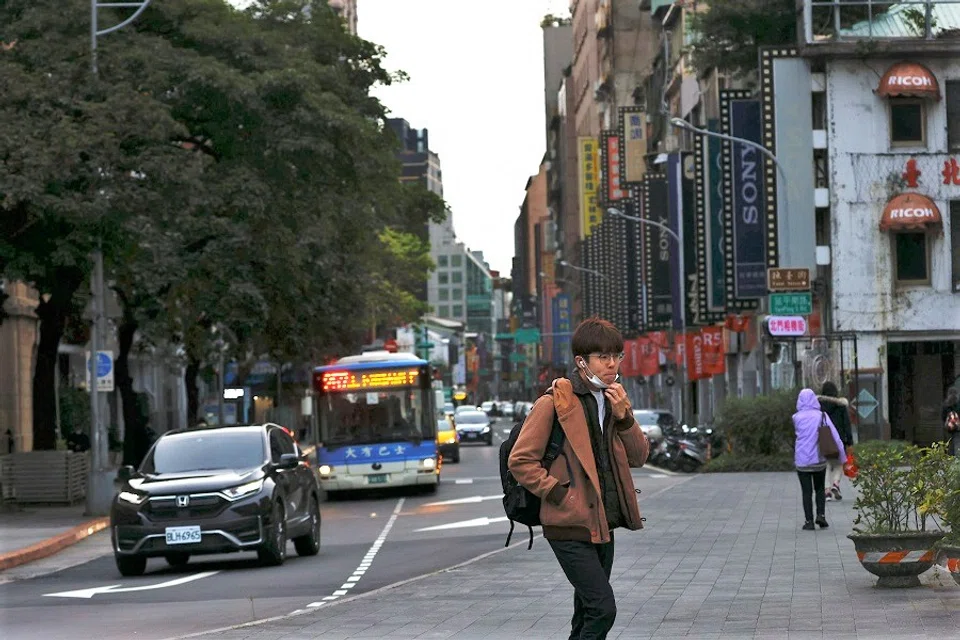
Many Hong Kongers moved to Taiwan over the past few years after the anti-extradition bill protests broke out in Hong Kong in 2019. However, this trend is seeing a dip in 2022.
A total of 36,789 Hong Kongers moved to Taiwan from 2019 to 2022, with an average of about 9,000 immigrants per year. This is a huge jump from 2018 when Taiwan only received about 4,000 Hong Kongers.
However, after reaching a record high of 11,173 in 2021, this figure fell by 20% last year to 8,945. And out of the latter, only 1,296 of them have received Taiwan identification (ID) cards, i.e., permanent residency.
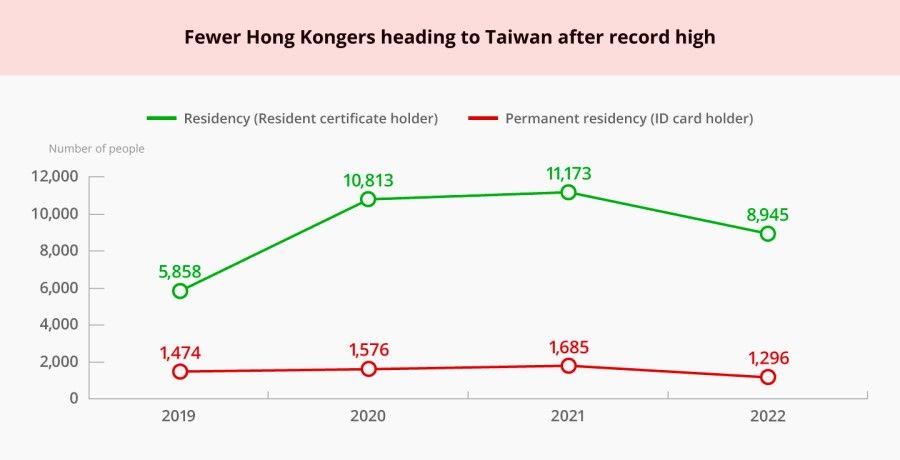
Hong Kong's emigration wave
This is just a small reflection of Hong Kong's emigration wave.
Data from Hong Kong's Census and Statistics Department showed that Hong Kong's population had fallen from about 7.52 million in 2019 to about 7.33 million in 2022, representing a decrease of more than 190,000 residents.
It is generally estimated that as many as 200,000 to 300,000 Hong Kong residents have left Hong Kong, including those currently residing in popular immigration countries such as the UK, Australia, Canada and the US and whose permanent residency applications are still pending.
Experts believe that in the next five years, as the pandemic situation stabilises in Europe and the US, around 140,000 to 150,000 Hong Kongers could emigrate.
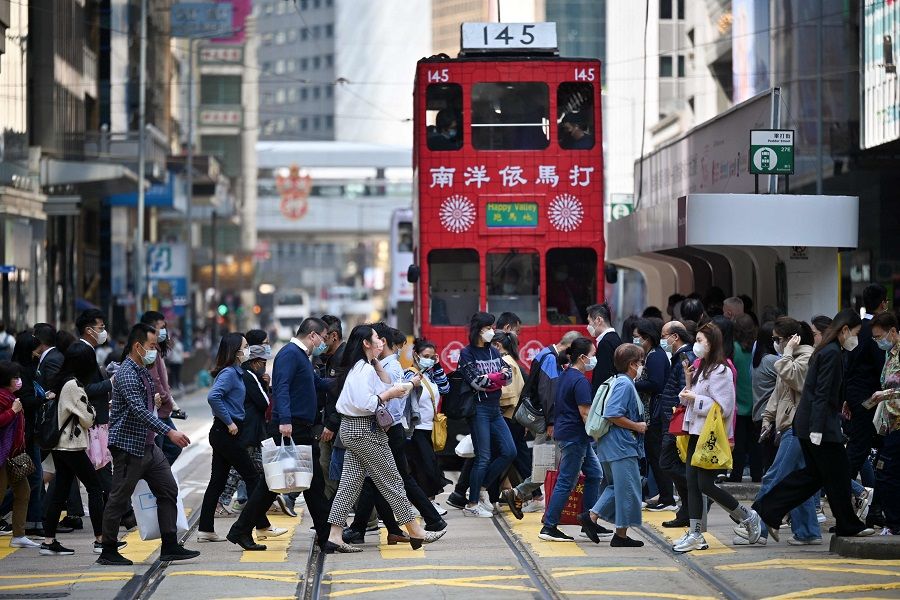
Taiwan and Hong Kong share similar language and ethnicity, and are geographically close. Taiwan is also the Chinese region with the largest number of immigrants from Hong Kong. But why is Taiwan suddenly seeing a decline in the number of Hong Kong immigrants?
Immigration consultants, academics and Hong Kongers who have moved to Taiwan told Zaobao that the failure to obtain ID cards is the main reason why more and more Hong Kongers are turning away from Taiwan.
Interviewed Hong Kongers express their disappointment, helplessness and even exasperation because "none of the Hong Kongers" they have met in Taiwan have been successful in their ID card applications.
Only 2% get ID cards
An immigration consultant who prefers not to be named estimated that over the past three years, 95% of Hong Kongers who applied for resident certificates in Taiwan were successful, but only about 2% of them received ID cards, or permanent residency. Interviewed Hong Kongers express their disappointment, helplessness and even exasperation because "none of the Hong Kongers" they have met in Taiwan have been successful in their ID card applications.
This wave of Hong Kong immigrants mainly moved to Taiwan as skilled or investment immigrants. According to Taiwan's law and regulations regarding Hong Kong and Macau affairs, residents can apply for permanent residency after a year of residence, while investment immigrants are required to run a company for at least three years.
In fact, the process is not so straightforward. Many Hong Kongers claimed that when they tried to apply for an ID card after fulfilling the requirements, the authorities would make further requests for professional licences or additional documents to delay the process.
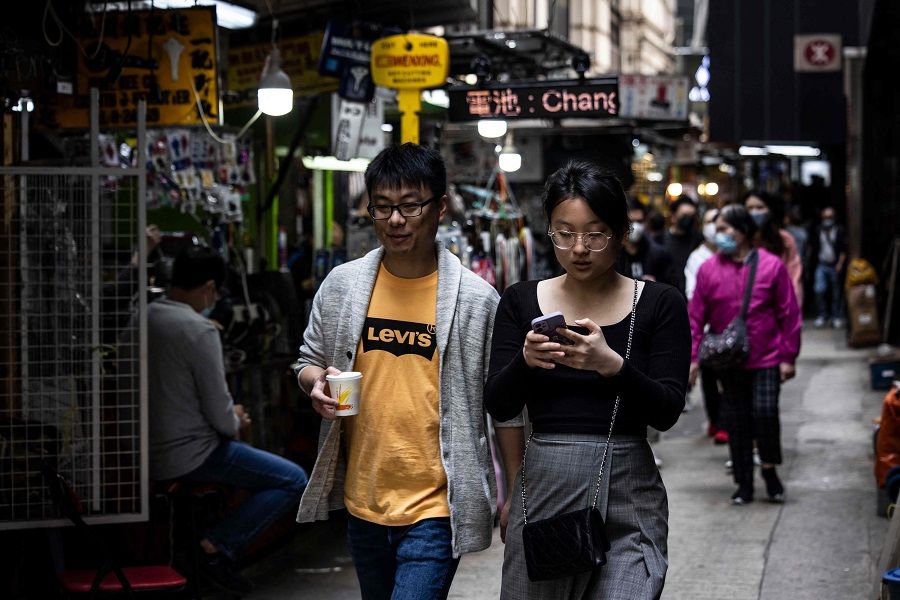
The aforementioned immigration consultant said that the crux of the issue is that Taiwan has an excessive amount of red tape, national security concerns, and even an unspoken xenophobic and conservative mentality.
"Many applications were rejected due to national security concerns because applicants had previously worked for mainland Chinese-funded companies." - an immigration consultant
He said that Taiwan's National Immigration Agency (NIA), Mainland Affairs Council (MAC) and National Security Council currently meets monthly to review ID card applications filed by immigrants from Hong Kong. The Ministry of Economic Affairs' Investment Commission would join the meeting if the group were to review applications from investment immigrants.
"Many applications were rejected due to national security concerns because applicants had previously worked for mainland Chinese-funded companies," he added, noting that another way in which authorities delay the issuance of ID cards is by requesting additional financial documents for the coming year, which is indirectly sentencing them to another year in "immigration jail".
He said that this not only prevents Hong Kongers from filing for administrative appeals but also allows the authorities to control the number of ID cards issued. "Of course the Hong Kongers are angry!" he said.
The MAC told Zaobao that Taiwan saw an influx of immigrants from 2019 to 2021 due to the changing situation in Hong Kong. It added that relevant departments meet monthly to review ID applications "in principle", but this could be "flexibly adjusted based on caseload", stressing that "applications will be approved as long as there are no national security concerns". As for the professional review required for investment immigrants, the MAC said that most cases are delayed because of incomplete documents.
Some Taiwanese also believe that Hong Kong's "one country, two systems" model is eroding and increasingly being infiltrated and controlled by the Chinese Communist Party, which is why they are hesitant to relax the measures, the MAC added. In the future, the MAC will amend regulations concerning Hong Kong and Macau residents' move to Taiwan based on national security considerations and social consensus.
"Some Hong Kongers withdraw or reduce their capital and close their businesses after obtaining their ID cards." - Mainland Affairs Council (MAC)
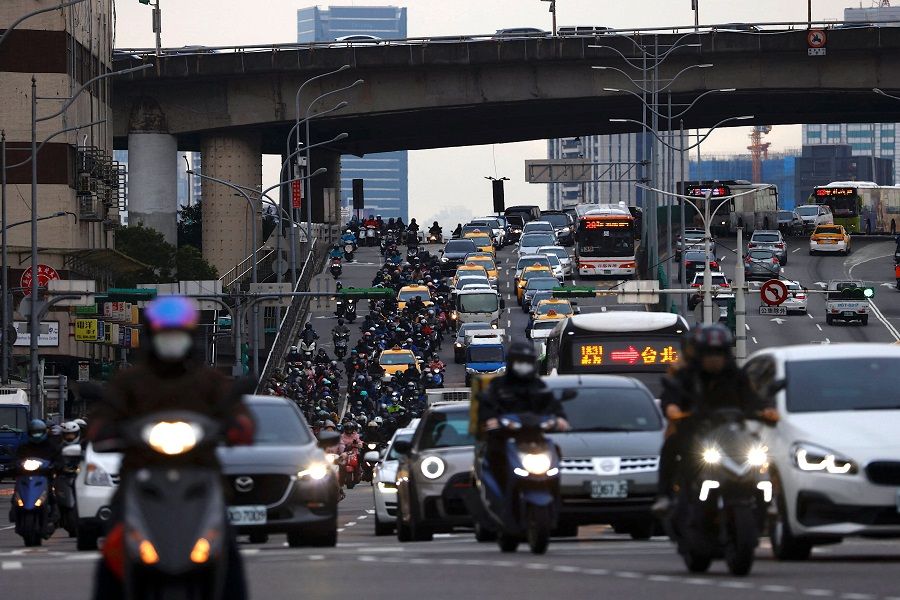
According to the MAC, the immigration agency discovered that some Hong Kongers withdraw or reduce their capital and close their businesses after obtaining their ID cards. Some did not resign from their jobs in Hong Kong, or have even applied for financial aid for low-income households after withdrawing their capital. It said, "These situations are against the intention and expected benefits of our investment immigration policy, and some cases are still under observation for now."
The MAC stressed that the authorities have continued to comprehensively review and amend relevant regulations and welcome elites, key talents and students from various industries to visit or permanently reside in Taiwan.
First case study: youth who fled Hong Kong after anti-extradition bill protests
Thirty-year-old Tom Woon fled to Taiwan in 2019 after participating in the anti-extradition bill protests in Hong Kong. In Taiwan, he studied part-time for a Master's degree in business management and sold egg waffles at Shilin Night Market five days a week.
After obtaining his Master's degree in July 2022, he opened a Hong Kong-style cafe in Ximending with two other Hong Kong friends who have since become Taiwanese residents. The cafe, 3652 (叁陆伍贰), is named after the jail term for violators of the Hong Kong national security law: ten years, including two leap days, hence 3,652 days in total.
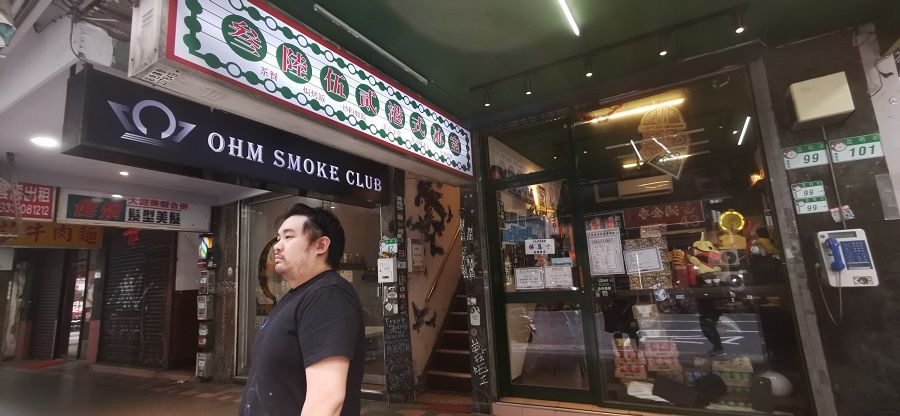
Woon said that the cost of opening a shop in Taiwan is four times cheaper than in Hong Kong, and hopes to preserve the culture and food of ordinary Hong Kongers through the cafe, bringing a piece of home to Hong Kongers living in Taiwan. He even hopes to open another branch once he breaks even. He is now looking forward to April, when his family, whom he has not seen in three and a half years, comes to visit.
He had previously held a student visa but now holds a work visa that he renews every year. ID cards are usually issued after five years of work experience.
Second case study: nurse who had to return to Hong Kong
Even after enduring more than a year of being separated from his wife in Hong Kong, 47-year-old Lee had no choice but to return to Hong Kong as he was unable to find a job or obtain an ID card in Taiwan.
Lee and his wife, 44, had worked as nurses for over two decades in Hong Kong and did not participate in the anti-extradition bill protests in 2019. Worried about their future and hoping for a freer and more democratic living environment in Taiwan, Lee applied to move to Taiwan in early 2020 as a skilled immigrant with the help of an immigration consultant.
After obtaining his Taiwan resident certificate, Lee bought two flight tickets to leave Hong Kong on 8 June 2021. But he would find himself landing in Taiwan alone after his wife's resident certificate was not approved in time.
Lee said that skilled immigrants holding resident certificates must draw an above-average monthly salary of at least 47,971 NTD (US$1,570) working in Taiwan, and that employers must also seek permission from the authorities to hire them. Many Hong Kongers failed to find a job, and Lee also signed up for several training courses like everyone else, hoping to find a job after receiving an ID card.

Meanwhile, his wife continued to work in Hong Kong and would wait six months before her resident certificate was approved. But because of the anti-Covid measures in place at the time, travellers to and fro Taiwan had to be quarantined. The couple finally reunited 14 months later on 21 August 2022.
Lee applied for permanent residency after living in Taiwan for a year, but he received a letter from the authorities five months later, requesting that he fulfil an additional requirement - obtain a professional licence or engage in professional work.
Lee lamented that the nursing practice in Hong Kong is different from that in Taiwan; many of his peers had failed to pass the professional exam to become a certified nurse in Taiwan.
In Hong Kong, Lee took care of patients recovering from mental illness, and had obtained a senior health manager licence after he came to Taiwan. But the authorities insisted that he must obtain the licence to become a registered nurse.
Living off his savings in a rented apartment, Lee spent a year taking training courses in Taiwan. But he has since returned to Hong Kong in December last year. Having spent a considerable amount of time and money, he felt that the new requirements that were only added a year later were unreasonable. He plans to appeal to the authorities and hopes to have a chance to give back to society by educating the public on disease prevention.
Third case study: hospital ward supervisor received ID after 18 months
A 59-year-old hospital ward supervisor surnamed Tse received her ID card one and a half years after moving to Taiwan. She said that the process was difficult, and none of her friends were successful in their applications.
Aware of the different views among her staff members, Tse did not participate in the anti-extradition bill protest, but is worried that Hong Kong is going from the rule of law to the rule of man, and decided to migrate to Taiwan with her 61-year-old accountant husband and their 18-year-old daughter.
When she first arrived in Taiwan in August 2021, the authorities did not explicitly state that she had to get a professional license, but she did so anyway at the suggestion of an immigration consultant.
... many migrant investors paid a heavy price, investing a lot of money but making a loss due to Covid-19. Furthermore, they had to deal with authorities suspecting that they were making false investments, which was truly distressing. - Tse, hospital ward supervisor
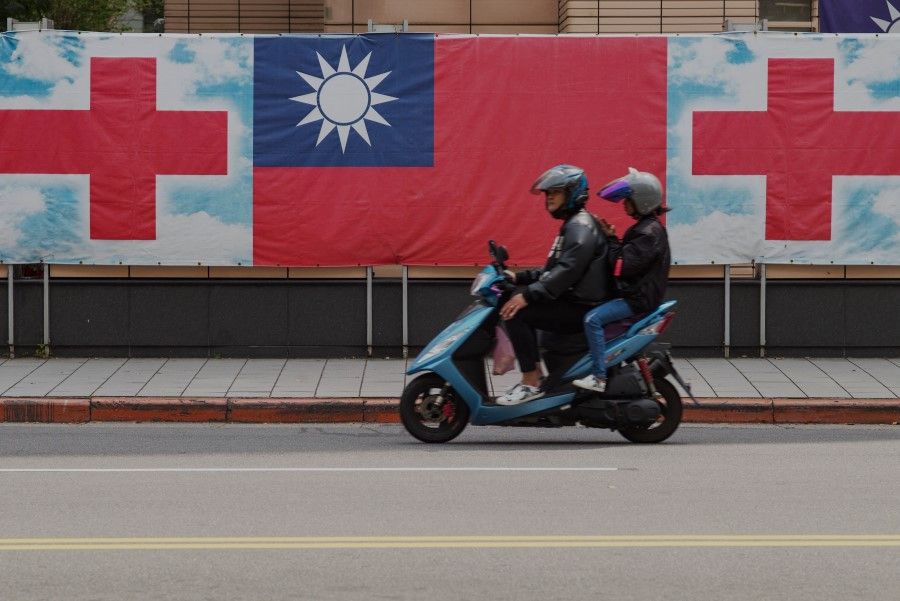
She lamented that the process of getting the license was a hassle for many people, and some even gave up midway.
She spent four months arranging for her relatives to have her academic results certified by the Taipei Economic and Cultural Office in Hong Kong, translated to Chinese and mailed to Taiwan for verification. Only then could she take the professional exam in Taiwan.
She knows about 20 Hong Kong families based in Taiwan, including migrant investors and nurses, and so far none of them successfully received an ID card. Three families have since migrated to the US and Canada; three have returned to Hong Kong; the others are still waiting.
She sympathised with them, saying that many migrant investors paid a heavy price, investing a lot of money but making a loss due to Covid-19. Furthermore, they had to deal with authorities suspecting that they were making false investments, which was truly distressing.
She knows that many Hong Kong nurses want to stay and contribute in Taiwan, but the standards of the Ministry of Examination are getting tougher for them to meet. She suggests first allowing them to work in the nursing field at lower salaries, to prove that they really want to migrate and serve, before considering whether to approve their ID card.
Causeway Bay Books founder might become Taiwanese permanent resident this year
Causeway Bay Books founder Lam Wing-kee, 67, came to Taiwan in exile four years ago and has yet to receive an ID card, but hopes to become a Taiwanese permanent resident by the end of this year.
Lam founded Causeway Bay Books in Hong Kong in 1994. In 2015, he was arrested at the Lo Wu customs between Hong Kong and Shenzhen, and imprisoned for eight months. He migrated to Taiwan in April 2019, and one year later raised 6 million NTD (US$196,400) to set up Causeway Bay Books in Taiwan. Taiwanese President Tsai Ing-wen even took a photo with him at the bookstore and left a Post-It on the Lennon Wall on a bookshelf with the message "A free Taiwan supports Hong Kong's freedom".
Taiwan's health insurance system, the cost of treatment in Taiwan is just 10% of what it would be in Hong Kong, while the rent for the bookstore is also a quarter of Hong Kong's prices. - Causeway Bay Books founder Lam Wing-kee
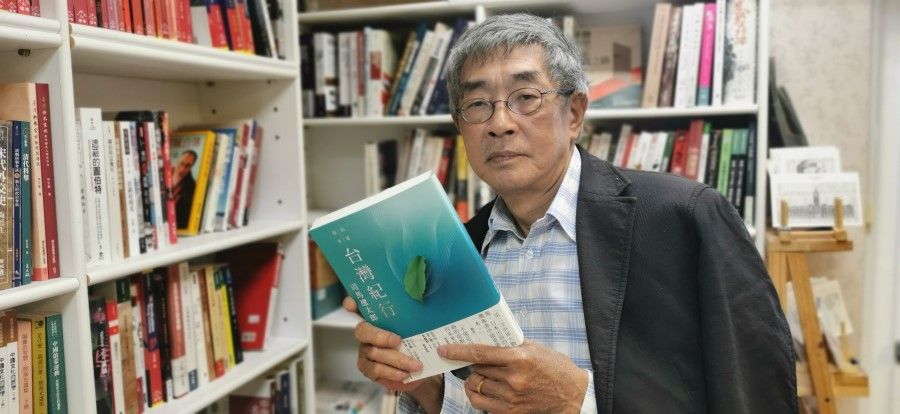
He told Zaobao that he initially came to Taiwan as a visitor, and due to his work, he was able to gain residency, which had to be renewed every two years. Early last year, an officer from the NIA got in touch to say that they would help him apply for an ID card through the skilled immigrant immigration channel. He would need to write a submission on how he would contribute to Taiwan through cultural work.
But as he was preparing the submission, he was diagnosed with stage 1 lung cancer and had to undergo chemotherapy last September. The NIA officer offered to help him finish the submission, and if all goes well Lam will become a Taiwanese permanent resident when his resident certificate expires at the end of this year.
Lam sees the pros and cons of life in Taiwan. He says that with Taiwan's health insurance system, the cost of treatment in Taiwan is just 10% of what it would be in Hong Kong, while the rent for the bookstore is also a quarter of Hong Kong's prices. He feels that the Taiwanese people are more personable, the toilets are cleaner, the cost of living is low, and the quality of life is good.
However, he says that Taiwan is relatively insular, and even somewhat conservative and xenophobic, while its bureaucracy is inefficient, vague and unwilling to take responsibility, which leaves room for improvement.
Thinking back on his exile and the current state of Hong Kong, he feels that one has to speak up and oppose injustice, but urged Hong Kong's young people to protect themselves, noting that they do not have to stay and fight and put themselves in danger.
"Hong Kongers are more important than Hong Kong, and people are more valuable than anything," he exclaimed. He hopes that Taiwan will become a more mature democracy, so that it will have a greater influence on mainland China.
Incomprehensive policies make migrating to Taiwan risky
Academics interviewed by Zaobao said that Taiwan has no immigration policy, only laws and administration, so the immigration process is risky and needs to be considered carefully.
Professor Bennis So of the Department of Public Administration at the National Chengchi University said that Taiwan does not have a comprehensive policy to attract immigrants; the NIA is only a low-ranking agency with insufficient policymaking powers under the Ministry of the Interior.
Many Hong Kongers live in Taiwan for a year, only for the NIA to shift the goalposts and implement additional rules. - Professor Bennis So, Department of Public Administration, National Chengchi University
Prof So, who migrated to Taiwan from Hong Kong 20 years ago, said that Taiwan separates the right of residency from the right to work. Those who have residency rights still have to apply for employment approval.
He recalled that in the past decade or so, Hong Kongers usually got residency approval after living in Taiwan for a year, and could get an ID card thereafter - that became a reasonable hope for Hong Kongers. Now, the rules of the game are generally unclear. Many Hong Kongers live in Taiwan for a year, only for the NIA to shift the goalposts and implement additional rules. No wonder Hong Kongers are unhappy to be held hostage by such inconsistencies.
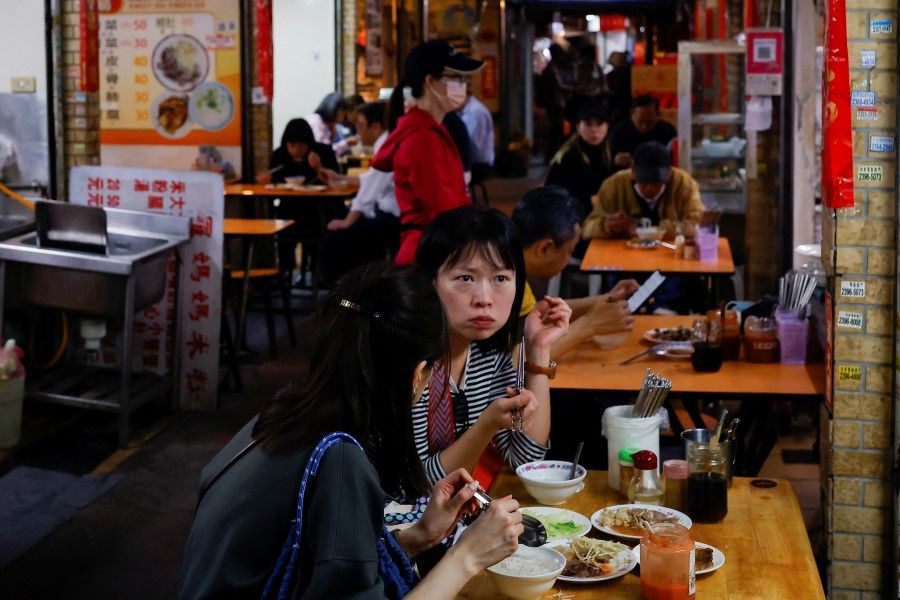
Prof So pointed out that in order to clear cases by the deadline, the NIA often rejects permanent residency applications on the grounds of national security concerns.
According to an informed source, while Hong Kongers are required to submit a Certificate of No Criminal Conviction upon request, usually several months after applying for permanent residency, many people cannot go back to Hong Kong to get the document because they have evaded the national security law.
Prof So said that many Hong Kongers used to think that the Taiwan government was supportive of Hong Kong, but amid these issues, the good feeling has turned sour.
He said that migrating to Taiwan is a big risk bearing too many uncertainties, and he suggested that Hong Kongers should refrain from moving the whole family to Taiwan if there is no need.
Hong Kongers may not be welcome after all?
A female university professor who migrated to Taiwan 20 years ago and declined to be named told Zaobao that she knows of over 20 people who migrated to Taiwan - after 2019, none of them has received permanent residency, and even applications as a dependent are usually rejected.
"Maybe they feel that Hong Kongers are difficult people who like to air their opinions, and worry that if there are a lot of them around, it will be another hindrance to the government." - an immigration consultant
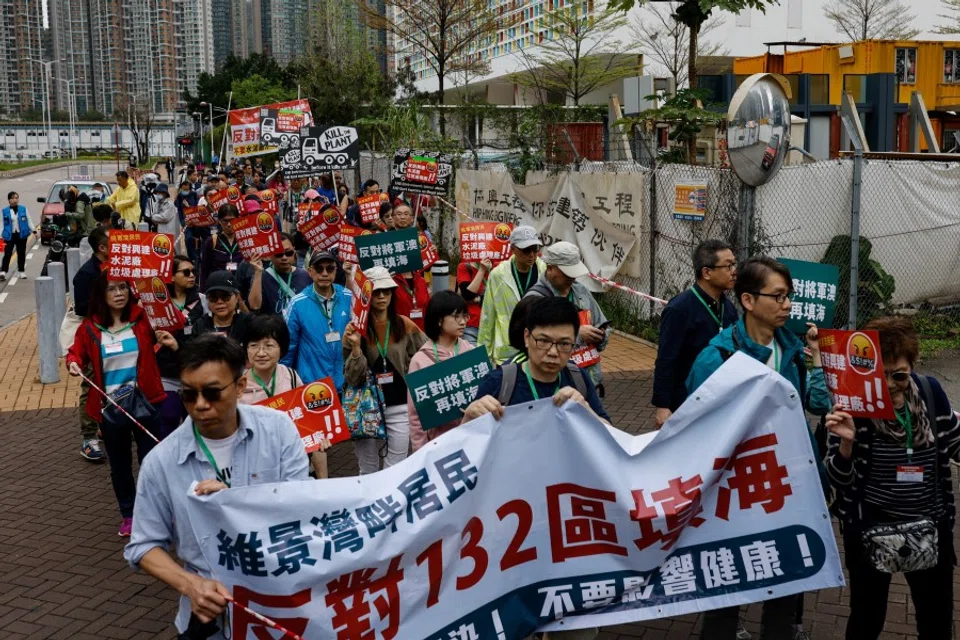
She feels that Taiwan's handling of Hong Kong migrants might also have to do with election considerations, with concerns that Hong Kongers might be more inclined to the pro-establishment Blue camp, which might be detrimental to the Democratic Progressive Party (DPP) government. At the same time, Hong Kongers are more fluent in English, and there is a worry that Taiwanese will have their jobs taken away, which could cause backlash from local voters.
She said, "I am always supportive of students from Hong Kong, hoping they do well academically and prove that they are real talents and elites, to change Taiwanese perceptions of Hong Kongers."
An immigration consultant who declined to be named felt that the DPP government is not keen on letting Hong Kongers migrate to Taiwan. He surmised, "Maybe they feel that Hong Kongers are difficult people who like to air their opinions, and worry that if there are a lot of them around, it will be another hindrance to the government."
He said frankly, "I have recently been advising clients not to rush into applying for permanent residency, and to maybe wait for a change of ruling party, because the presidential election is coming up soon next year, and the application process might be faster after a change of head."
This article was first published in Lianhe Zaobao as "等不到身份证港人"转台"退潮".
